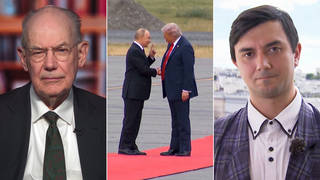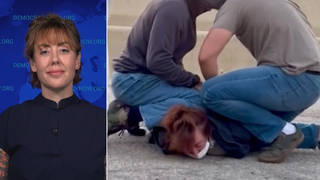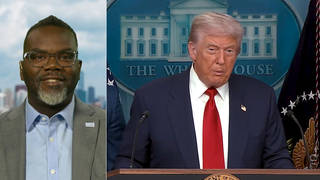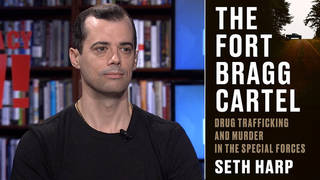
Topics
New York Times reporter Judith Miller was sent to jail Wednesday after a federal judge declared that she was “defying the law” for refusing to divulge the name of a confidential government source in the outting of undercover CIA operative Valerie Plame. Matthew Cooper of Time magazine, was spared after announcing a last-minute deal with a confidential source that he said would allow him to testify before a grand jury. We speak with New York Times Op-Ed columnist Bob Herbert. [includes rush transcript]
New York Times reporter Judith Miller was sent to jail Wednesday after a federal judge declared that she was “defying the law” for refusing to divulge the name of a confidential source. Miller along with Matthew Cooper of Time magazine had been refusing to reveal their confidential sources in the outing of undercover CIA operative Valerie Plame. Cooper was spared jail time after agreeing to testify in the investigation.
- Matthew Cooper, Time Magazine:
“That source gave me a personal, unambiguous, uncoerced waiver to speak to the grand jury. And it was only then, when I was satisfied that that source was comfortable with me speaking and indeed wanted me to speak to the grand jury that I felt free after 2 years under threat of jail to go speak to the grand jury.”
Judge Thomas Hogan ordered Miller sent to “a suitable jail within the metropolitan area of the District of Columbia” until she decided to talk or until the term of the grand jury expired in October. Matthew Cooper spoke to reporters outside the courthouse after Miller was taken into custody.
- Matthew Cooper, Time Magazine:
“This is a sad day not only for journalist, but also for the country. It is a sad time when two journalist, who are doing their job and are trying to keep confidentiality in reporting important stories, face the prospect of going to prison by keeping their confidence. It is a very sad day and my heart goes out to Judith, when she left the court I told her to stay strong.”
Before being taken into custody by three court officers, Miller told the judge “If journalists cannot be trusted to guarantee confidentiality, then journalists cannot function and there cannot be a free press.” Miller’s lawyer, Floyd Abrams spoke to reporters outside the courthouse.
- Floyd Abrams, attorney for Judith Miller:
“Judy is an honorable woman adhering to the highest tradition of her profession and the highest tradition of humanity. She has chosen at no benefit to herself and with no desire to be in prison, a choice to take the personal burdens of being jailed rather than betray a source who she promised confidentiality. She should be honored for that and she will be.”
After the hearing, Bill Keller, the executive editor of The Times, said “The choice [Judith Miller] made is a brave and principled choice, and it reflects a valuing of individual conscience that has been part of this country’s tradition since its founding.”
In an Editorial, the paper writes, “By accepting her sentence, Ms. Miller bowed to the authority of the court. But she acted in the great tradition of civil disobedience that began with this nation’s founding, which holds that the common good is best served in some instances by private citizens who are willing to defy a legal, but unjust or unwise, order.”
- Bob Herbert joined The New York Times as an Op-Ed columnist in 1993. His twice a week column comments on politics, urban affairs and social trends. His first book, “Promises Betrayed: Waking up from the American Dream” was published in May.
Transcript
AMY GOODMAN: We’re going to turn to a story here at home, and it is the one of the reporter, the New York Times reporter, Judith Miller, being sent to jail yesterday after a federal judge declared she was, quote, “defying the law” for refusing to divulge the name of a confidential source. Miller, along with Matthew Cooper of Time magazine, had been refusing to reveal their confidential sources in the outing of undercover CIA operative, Valerie Plame. Cooper was spared jail time after agreeing to testify, just yesterday, in the investigation.
MATTHEW COOPER: That source gave me a personal, unambiguous, un-coerced waiver to speak to the Grand Jury; and it was only then, when I was satisfied that that source was comfortable with me speaking and indeed wanted me to speak to the Grand Jury, that I felt free after two years under threat of jail, to go speak to the Grand Jury.
JUAN GONZALEZ: Matthew Cooper of Time magazine. U.S. District Judge Thomas Hogan ordered Miller sent to, quote, “a suitable jail within the metropolitan area of the District of Columbia,” until she decided to talk or until the term of the Grand Jury expired in October. Matthew Cooper spoke to reporters outside the courthouse after Miller was taken into custody.
MATTHEW COOPER: Judy is an honorable woman, adhering to the highest tradition of her profession and the highest traditionof humanity. She has chosen, at no benefit to herself and with no desire to be imprisoned, a choice, which is to take the burdens, the personal burdens, of being in jail rather than to betray a source to whom she promised confidentiality. She should be honored for that and I think in history she will be.
JUAN GONZALEZ: Matthew Cooper of Time magazine. Before being taken into custody by three court officers, Miller told the judge, quote, “If journalists cannot be trusted to guarantee confidentiality, then journalists cannot function and there cannot be a free press.” This is Miller’s lawyer, Floyd Abrams.
FLOYD ABRAMS: This is a sad day for — not only for journalists, for our country. It is a sad time when two journalists who were simply doing their jobs and trying to keep confidences and report important stories, face the prospect of going to prison for keeping those confidences. It is a very sad day. My heart goes out to Judy. I told her as she left the court to stay strong.
AMY GOODMAN: That was Floyd Abrams, the well-known free speech attorney, defends the press very often in major cases like these. He is New York Times reporter Judith Miller’s attorney. After the hearing, Bill Keller, the Executive Editor of The New York Times said, quote, “The choice Judith Miller made is a brave and principled choice, reflects a valuing of individual conscience that has been part of this country’s tradition since its founding.” In an editorial today, The New York Times writes, quote, “By accepting her sentence, Ms. Miller bowed to the authority of the court. But she acted in the great tradition of civil disobedience that began with this nation’s founding, which holds that the common good is best served in some instances by private citizens who are willing to defy a legal, but unjust or unwise, order.”
We are joined in the studio by New York Times Op-Ed columnist Bob Herbert, who writes a twice-a-week column about politics, urban and social affairs. He’s been with the Times since 1993 and before that with NBC, and before that with the Daily News His first book, Promises Betrayed: Waking up from the American Dream came out in May. Bob Herbert, I wanted to ask you about this piece today in The New York Times about Karl Rove, the top suspect for many people for the last two years, The New York Times quoting a source the paper says has been officially briefed on the case as saying that Matt Cooper’s source was indeed Karl Rove, but this detail is buried in the twenty-fourth paragraph of the Times lead story. The paper says Cooper’s decision to drop his refusal to testify followed discussions Wednesday morning among lawyers representing Cooper and Rove. The independent prosecutor, Peter Fitzgerald, was also involved in these discussions. Your response?
BOB HERBERT: Well, the longer I stay in this business, the more I feel like I’m in Never-Never Land. Stories used to be reasonably easy to cover. First, thanks for having me on the show this morning. I really appreciate it. But, you know, you look at this, and this is a problem that was created by the administration. The identity of this woman was disclosed. Robert Novak wrote a column about it. Matthew Cooper wrote a story about it. Judith Miller never wrote about it, and it’s Judith Miller who’s now gone to jail. What is going on here? What’s wrong with this picture? It’s craziness.
Judy had no option. That’s exactly what she needed to do. Nobody wants to go to jail; but, you know, we’re all journalists around this table. And you understand that it’s as simple as: If you give your word, you have to keep your word. And if you start betraying sources, you can no longer function in this business.
Another thing is, when you work for an organization like The New York Times or any large organization, you know, you’re annoyed by this, you’re annoyed by that. You complain, you know, it’s sort of like the nature of humanity. But I must say that the way the Times has handled this and the way Judy Miller has behaved is a case where it makes you really proud to be part of an organization. I think The New York Times is standing really tall today.
JUAN GONZALEZ: In contrast, you have the reality of Time magazine, not only bowing to the court decision and turning over the notes of its reporter and, of course, you have the glaring reality that Novak, the columnist at the center of the whole thing, continues to remain silent, showing no kind of solidarity for Judith Miller. No matter what he may think of her reporting or her positions, his willingness just to remain completely silent is something that is just astounding.
BOB HERBERT: Well, you know, I’m not sure I would expect Novak to step forward and do at least what I would perceive to be the right thing, but it is astounding in the community of journalism that you would have someone who essentially is responsible for the story — I mean, it was his story — and, you know, the fallout falls on everybody else. I mean, somebody used the term “collateral damage.” And that’s exactly what this is like. It’s bizarre.
AMY GOODMAN: I wanted to get your comment, Bob Herbert, on the comment of a guest we had on a little while ago on June 28. We had Jim Naureckas of Fairness and Accuracy in Reporting. And we were dealing with the whole issue of, is this about protecting whistleblowers or shielding government wrongdoing? Judith Miller, the National Security correspondent, has long done front-page pieces, alleging weapons of mass destruction, using anonymous sources. You, on the other side of the A section, on the Op-Ed page, have been quite critical of the invasion of Iraq. But I wanted to get your comment on Jim Naureckas’s feeling about what Judith Miller did?
JIM NAURECKAS: Anonymous sources can be very important in revealing government wrongdoing, but in this case, the anonymous source is a government wrongdoer. This is someone who is presumably acting on behalf of the administration to silence an administration critic, and to say that the reporters who have witnessed this crime have an absolute right not to testify about it is to say that the government has an absolute right to reveal any confidential information that the government has about individuals in order to punish those individuals for speaking out against the government. And that’s just a — that’s a sweeping power that I think it would be very dangerous to give the government.
AMY GOODMAN: That’s Jim Naureckas of Fairness and Accuracy in Reporting. Your comment?
BOB HERBERT: Well, a couple of points as a reporter and in many ways an old-fashioned reporter that takes the pen and the notebook and goes out there and covers stories. There is a simple way of looking at this. It’s what I said before. It’s if you give your word, you have an obligation to keep your word. If you tell somebody for whatever reason that you’re not — that you want them to talk to you, you want them to give you information, and you are not going to disclose their identity, then that’s what’s absolute in this case. You cannot go back on your word. The second part, which is more complex, is his point about whether there’s a claim that she has an absolute right not to identify her source. I don’t think journalists are saying that they have an absolute right in all cases not to identify their sources. I think what journalists are saying, or the ones who are going to stand tall, is that they will not identify their sources. It’s almost like civil disobedience. So this has gone through the courts. It’s gone up to the Supreme Court. The New York Times and Judith Miller were on the wrong side of the decision. And so, she has gone to jail. it’s not that she’s claiming an absolute right to anything. It’s that she’s asserting that she will not disclose her source.
AMY GOODMAN: But the idea that anonymous sources are there for — to protect whistleblowers, people could lose their jobs, people in other countries or perhaps here who feel that their families are threatened, and that what the major press has done in the lead up to the invasion and the coverage of the occupation, and particularly The New York Times, and particularly Judith Miller as National Security correspondent — I mean, the Times had their own basically mea culpa on page A-10 that identified many of the stories — was use anonymous sources not whistleblowers, but just covering the identities of government officials who were lying and wanted to put forward their argument about weapons of mass destruction. It turned out not to be true.
BOB HERBERT: Well, in the first place, I don’t see a reporter’s assertion of the need to keep sources confidential as limited to whistleblowers. I mean, I have used confidential sources. I try to use them sparingly. But I have used confidential sources in cases where they were not whistleblowers. I mean, you know, you can use — you can offer confidentiality for any reason you want. Frequently reporters use confidentiality in strictly political cases. I mean, there may be a political campaign, and somebody says, 'hey, you know, so and so has been doing this,' and you go back and check it, and it turns out to be true. But you don’t want to reveal who initially tipped you off to it, that’s a confidential source, and you don’t disclose that source. The other thing is I don’t think the issue of the type of stories that Judy Miller was doing is what’s significant here. You can agree or disagree with some of Judy Miller’s stories, but the fundamental issue here is whether you are going to betray a trust or not. And as far as I’m concerned, you cannot betray a trust. By the way, I don’t consider that limited to journalism. I think it’s incredibly important in journalism and beneficial to the journalism community, but also to Americans as a whole. I mean, that’s the fundamental issue there. But I feel the same way in any other realm of life. You don’t betray your sources.
JUAN GONZALEZ: And we only have about a minute left. I’d just like to ask you, in terms of your book, Promises Betrayed: Waking Up from the American Dream, a collection of columns, you have been called a conscience of The New York Times, and I know we worked together many years ago, but being at the Times, how has it been trying to maintain a progressive voice within what is essentially — has been a centrist editorial page for many years?
AMY GOODMAN: And you have ten seconds for that answer.
BOB HERBERT: It’s been easy. I mean, the wonderful part of working on the Op-Ed page is the freedom that they allow you. I mean, you cover what you want, and your opinions are your own. And they do not interfere with you.
AMY GOODMAN: Bob Herbert, we have to have you back. We certainly didn’t plan on the latest developments in Britain.
BOB HERBERT: Don’t worry about that.
AMY GOODMAN: I want to thank you for being with us.














Media Options